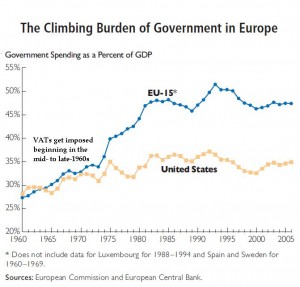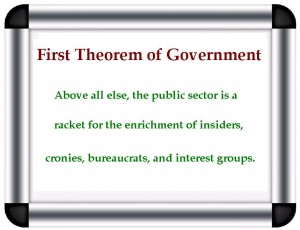I’m not overly optimistic about the outcome of the government shutdown fight. In part this is because our system of government, based on separation of powers, means it is very difficult to change the status quo.
This system, by the way, generally has been good for the country. It probably helps to explain why the United States has not traveled as rapidly in the wrong direction as other industrialized nations. Simply stated, the left didn’t have easy opportunities to impose bad policies such as a VAT or single-payer government-run healthcare.
direction as other industrialized nations. Simply stated, the left didn’t have easy opportunities to impose bad policies such as a VAT or single-payer government-run healthcare.
But it also means it isn’t easy for supporters of small government to undo expensive policy mistakes such as Obamacare.
But I’m glad some people are trying to do the right thing, even though they not only have to fight Obama, but they also need to overcome a biased media that is serving as an echo chamber for the left’s talking points.
I deal with some of that bias in this interview on Canadian TV. The hosts were very polite and gave me plenty of time to make my points, but all their questions could have been written in the White House communications office.
Here are a few takeaways from that interview.
The fact that Obamacare is the law today does not mean it must be enshrined forever. A lot of folks in the media are regurgitating this White House talking point. I pointed out that the Continuing Resolution also is the law, but maybe I should have pointed out that politicians change the tax code all the time.
As hinted at above, this fight is not a sign of dysfunctional government, but rather is an example of how our Founding Fathers expected Washington to function.
Media bias is covering up angst and division on the Democratic side of the aisle. My Democrat friends on the Hill have told me they are worried about being forced to cast votes in favor of provisions such as the special Obamacare exemption for politicians. But as this Glenn McCoy cartoon implies, the press is pushing the left’s narrative rather than reporting the news.
Republicans won a policy victory as a result of the 1995 shutdown fight and they at least fought to a draw in the 1996 elections.
This is a fight to save America from turning into a bankrupt European-style welfare state. Even if that’s an uphill battle, that’s a fight worth having.
Using the example of corrupt agriculture subsidies, I explain that Obamacare won’t work very well, but that doesn’t mean it won’t lure more people into government dependency.
I like to think I did a decent job in this interview, but now it’s time to confess that this isn’t just a battle against Obama and the media.
If we want to shrink the size and scope of government, we also need to prevail against the lobbyist community. This is especially the case in the shutdown fight.
These excerpts from a Politico article reveal how Washington really works.
Though President Barack Obama often blames special interests and Washington lobbyists for the dysfunction and paralysis that plagues Beltway politics, most of the working K Street — and their clients — would like nothing better than for Congress to start working again on the routine business of drafting, debating and passing legislation. …“When Congress doesn’t do things and when Congress is not productive, people who are trying to influence Congress are not productive,” said Steve Elmendorf, a Democratic lobbyist who was a top adviser to former House Majority Leader Dick Gephardt. …Urban, who was a top staffer to former Sen. Arlen Specter (R-Pa.), said the latest fight over spending are throwing a wrench in K Street’s bread and butter work of tweaking legislation and attracting new client business. “The wide variety of client business — interests that come to Washington lobby — is now interrupted,” Urban said about the shutdown. …no major pieces of new legislation have moved since the takeover of the House by the GOP in 2010 —putting a big damper on new business development and existing client work. …”Not that we should be doing policymaking on K Street’s behalf,” Gold added. “But that’s the reality.”
In other words, the parasite class in DC wants “business as usual.” They want the government open so they can strike their backroom deals.
 This is a perfect illustration of my “First Theorem of Government.” Washington insiders benefit from activist government. It means more money and power for the political class.
This is a perfect illustration of my “First Theorem of Government.” Washington insiders benefit from activist government. It means more money and power for the political class.
And notice how the lobbyists are complaining about less business ever since the 2010 elections. That’s because fewer laws mean fewer opportunities for graft and redistribution, so lobbyists suffer. Which is why I had to correct a massive typo when USA Today wrote that the Tea Party Congress was “unproductive.”
That “unproductive” Congress, by the way, reduced the burden of federal government spending from more than 24 percent of GDP to about 21.5 percent of economic output.
We should all be hoping that the current Congress is equally “unproductive” and we further shrink the burden of government spending and further curtail opportunities for political corruption.
